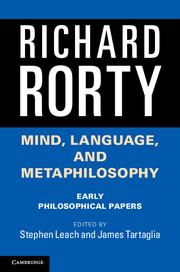Book contents
- Frontmatter
- Contents
- Foreword
- Acknowledgments
- Introduction
- 1 Pragmatism, categories, and language
- 2 The limits of reductionism
- 3 Realism, categories, and the “linguistic turn”
- 4 The subjectivist principle and the linguistic turn
- 5 Empiricism, extensionalism, and reductionism
- 6 Mind-body identity, privacy, and categories
- 7 Do analysts and metaphysicians disagree?
- 8 Incorrigibility as the mark of the mental
- 9 Wittgenstein, privileged access, and incommunicability
- 10 In defense of eliminative materialism
- 11 Cartesian epistemology and changes in ontology
- 12 Strawson’s objectivity argument
- 13 Verificationism and transcendental arguments
- 14 Indeterminacy of translation and of truth
- 15 Dennett on awareness
- 16 Functionalism, machines, and incorrigibility
- Index of names
- References
10 - In defense of eliminative materialism
Published online by Cambridge University Press: 05 June 2014
- Frontmatter
- Contents
- Foreword
- Acknowledgments
- Introduction
- 1 Pragmatism, categories, and language
- 2 The limits of reductionism
- 3 Realism, categories, and the “linguistic turn”
- 4 The subjectivist principle and the linguistic turn
- 5 Empiricism, extensionalism, and reductionism
- 6 Mind-body identity, privacy, and categories
- 7 Do analysts and metaphysicians disagree?
- 8 Incorrigibility as the mark of the mental
- 9 Wittgenstein, privileged access, and incommunicability
- 10 In defense of eliminative materialism
- 11 Cartesian epistemology and changes in ontology
- 12 Strawson’s objectivity argument
- 13 Verificationism and transcendental arguments
- 14 Indeterminacy of translation and of truth
- 15 Dennett on awareness
- 16 Functionalism, machines, and incorrigibility
- Index of names
- References
Summary
In this brief note, I should like to comment on two replies to my “Mind-Body Identity, Privacy, and Categories” – one by James Cornman and the other by Richard Bernstein. I shall concentrate upon a single point which is made by both critics.
In my article, I attempted to work out an analogy between talking about demons and talking about sensations, urging that sensation-discourse might go the way of demon-discourse, given the proper neurological discoveries and resulting neurological ways of explaining behavior. More specifically, I argued that “sensation” might lose its reporting role as well as its explanatory role, just as “demon” had lost both its roles, and that both of these roles might be taken over by reference to brain-processes.
In response to this strategy, Cornman argues that
Even if we grant that a pain is identical with a stimulation of C-fibers, it would seem that we still need sensation-terms to make the true descriptions of certain pains, or stimulation of C-fibers, as, for example, intense, sharp, and throbbing. No neurophysiological sentence is synonymous with “This pain (stimulation of C-fibers) is intense, sharp, and throbbing,” and thus no neurophysiological sentence can be used to make the same true description. Thus to eliminate the sensation-terms we apply to what we experience would seem to diminish our ability to describe considerably.
- Type
- Chapter
- Information
- Mind, Language, and MetaphilosophyEarly Philosophical Papers, pp. 199 - 207Publisher: Cambridge University PressPrint publication year: 2014
References
- 2
- Cited by



